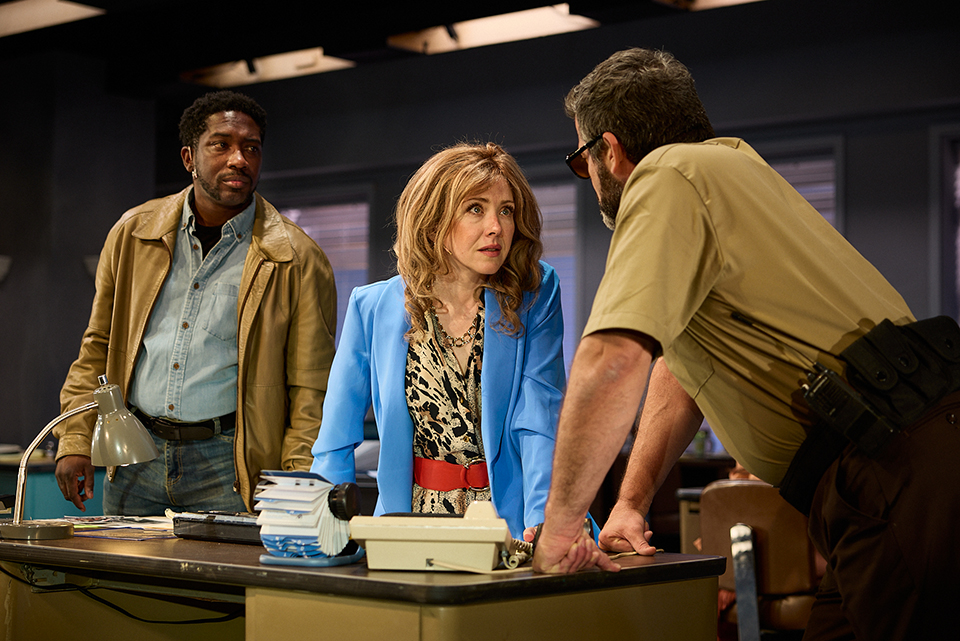Miami New Drama Explores the “Dangerous Days” and Aftermath of Arthur McDuffie’s Death

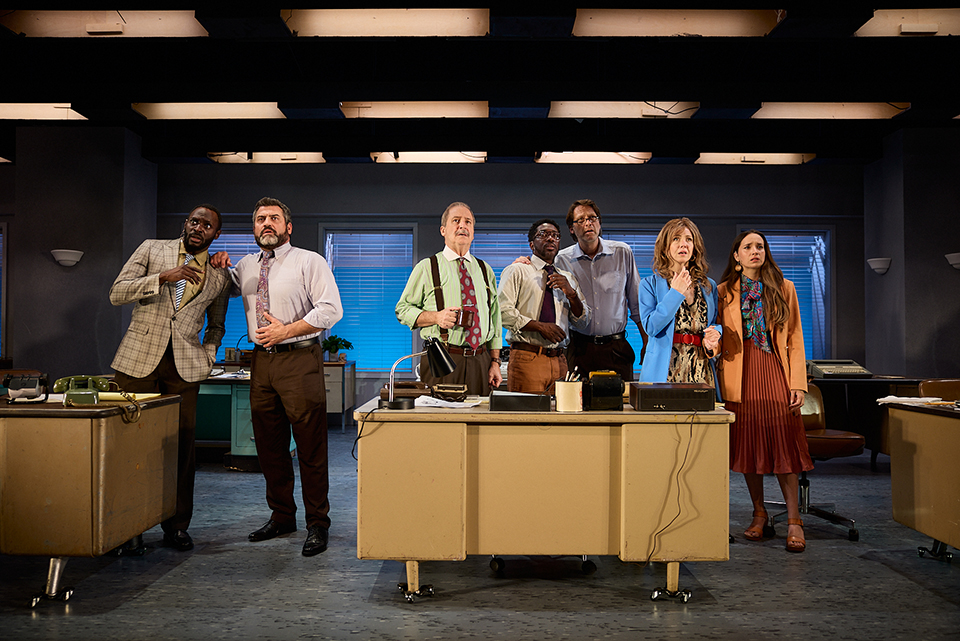
Reporters and editors watch as television coverage of the Miami riots begins in the Miami New Drama world premiere of “Dangerous Days” at the Colony Theatre, Miami Beach, which begins in previews on Thursday, April 8. (Photo courtesy of FURIOSA Productions)
By Christine Dolen
Do you remember the name Arthur McDuffie?
Maybe you recall Edna Buchanan, the Pulitzer Prize-winning Miami Herald newspaper’s crime reporter.
Her tenacious journalism helped lead to the revelation of a horrifying truth: More than 44 years ago, the Black insurance salesman and ex-Marine did not, as Miami and Dade County police claimed, become gravely injured when his motorcycle wiped out at the end of a high-speed chase through city streets near 2 a.m. on Dec. 17, 1979. In fact, McDuffie was surrounded by officers who beat him within an inch of his life, fracturing his skull in multiple places, leading to his death on Dec. 21.
The worst of those fractures, assistant Dade County Medical Examiner Ronald Wright would later testify, cracked McDuffie’s skull almost in half vertically and was the equivalent of what would have happened if the victim had fallen from a four-story building and landed between his eyes – on concrete.
The story of McDuffie, the acquittal of four officers by an all-white male jury after their trial was moved to Tampa, and riots in Miami that lasted for three days after the verdict was announced the morning of May 17, 1980, are a key component of Nicholas Griffin’s book “The Year of Dangerous Days.”
The 2020 nonfiction bestseller and National Book Award finalist paints an intricately detailed portrait of a chaotically violent year, with intertwined threads about the Mariel boatlift, the sharp rise in murders related to Colombian drug trafficking and the attempts of the city’s first Hispanic mayor Maurice Ferré to establish Miami as a banking gateway to Central and South America.
Now, the McDuffie-Buchanan story is resurfacing in a completely different way.
After previews at 8 p.m. Thursday, April 4, and Friday, April 5, the Miami New Drama world premiere of “Dangerous Days” will open at 8 p.m. Saturday, April 6, in the company’s home at the Colony Theatre on Miami Beach, where it will run through Sunday, April 28.
The London-born Griffin, his Venezuelan-born wife Adriana and their two children moved to Miami 11 years ago so that he could research and then write “The Year of Dangerous Days,” which was published by Simon and Schuster. The journalist, novelist, screenwriter and nonfiction author had sold the television and screen rights to his book, so when Miami New Drama’s co-founder and artistic director Michel Hausmann approached Griffin about writing a play based on it, the author said no.
“Then I found out my agent had carved out the stage rights, so the first thing I did then was say yes,” remembers Griffin. “I didn’t know how to get into it. If you follow one story, you have to go to Bogota, Cali and Miami. Or you have to go to Havana, Washington and Mariel. But if you follow the Edna story, you can stay in the newsroom and riff against those other things.”
Griffin turned to “Elián” playwright and play-writing teacher Rogelio Martinez, whose 2022 play about the protracted battle over returning Elián González to Cuba was another Miami New Drama world premiere drawn from history, for advice on writing his first-ever play.
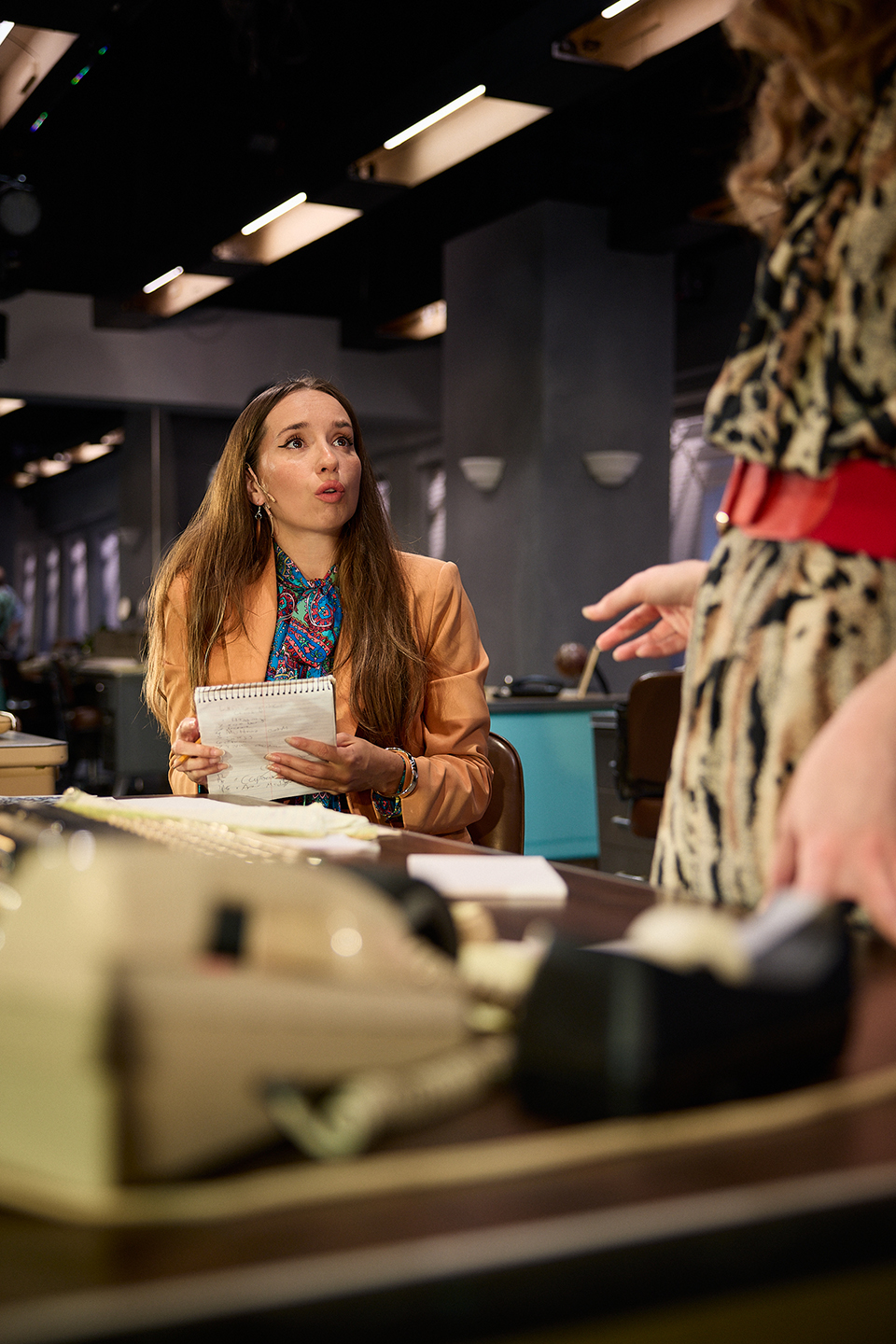
Krystal Millie Valdes as Anna listens to orders from Caitlin Clouthier’s Edna Buchanan in the Miami New Drama world premiere of Nicholas Griffin’s “Dangerous Days.” (Photo courtesy of FURIOSA Productions)
But when he turned in his first draft to Hausmann, Griffin says, “he said, ‘Thank you so much. You’ve given me a screenplay. You are thinking of theater in terms of its limitations. Think of it as emotional truth, release, imagination. Whose story is this? Edna always wanted to try to give the victim a voice – he has that now.’”
“He” being Arthur McDuffie.
“Dangerous Days” is likely not the play people with first-hand memories of McDuffie’s murder, the riots that claimed an additional 18 lives (and caused hundreds of injuries as well as $100 million in property damage) or Buchanan’s stream of vital stories written in the Herald’s now-demolished landmark building on Biscayne Bay might be expecting.
Though the play is grounded in events that happened long ago, the script has become more imaginatively and audaciously theatrical.
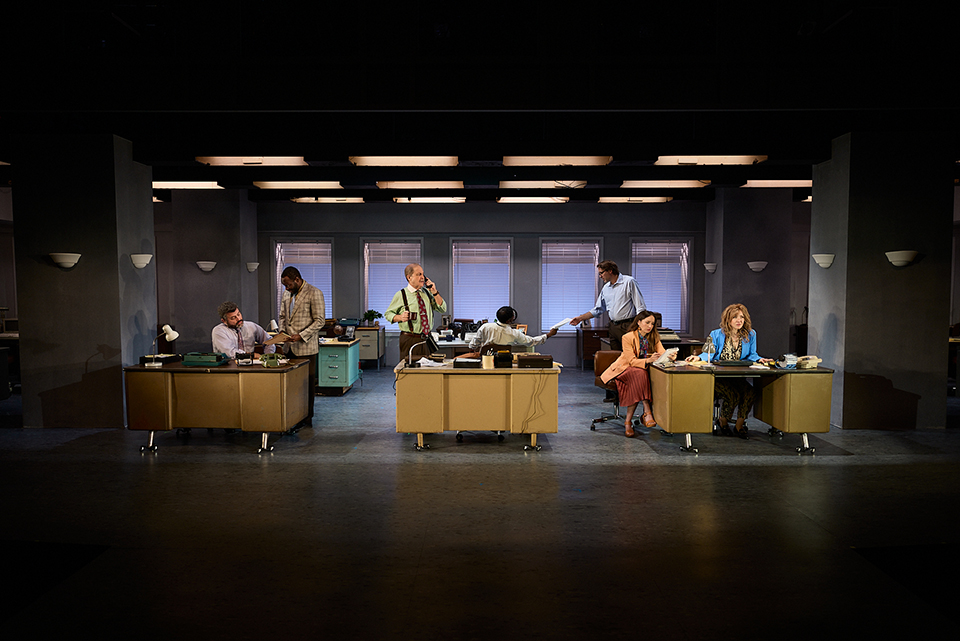
Reporters and editors work the Arthur McDuffie story in the Miami Herald newsroom in the world premiere of Nicholas Griffin’s “Dangerous Days.” (Photo courtesy of FURIOSA productions)
In collaborating with New York-based director-choreographer Jen Wineman, the cast (all South Florida actors except for Caitlin Clouthier, who plays Buchanan), designers and Hausmann, Griffin creatively speculates on everything from the cost to Buchanan of her nonstop coverage of gruesome crimes to what the 5’10”, 147-pound McDuffie might have said about his fate and the officers’ acquittal.
Centered in the Herald newsroom, “Dangerous Days” travels to multiple locations through the magic of theater. It contains humor – often in the exchanges between Buchanan (who famously turned in stories at the last minute so that editors didn’t have time to “improve” her copy) and her beleaguered editor “Larry” (played by Stephen Trovillion and based on several editors) – but Hausmann says those moments don’t take away from the “gravity and importance” of the story.
“Arthur McDuffie became a symbol. It’s powerful to see him as a human being,” says Hausmann. “If we are going to unearth the story of Edna and McDuffie, they both need to have a powerful presence and point of view – ultimately, you have to get into the minds of the characters. Edna was professional, cutthroat, precise, meticulous, nonstop. A dog with a bone who wouldn’t let go…there’s something profoundly heroic about her.”
Director-choreographer Wineman, who staged Kristoffer Diaz’s “The Elaborate Entrance of Chad Deity” for Miami New Drama in 2018 and now has “Five: A Parody Musical” (a show about Donald Trump and the women in his life) running Off-Broadway, focuses on new work. What interests her are plays involving comedy, magic and politics – all of which are components of “Dangerous Days.”
“The way Nick has written this is very magical in its form…When I first read the play in June, I found it very compelling,” says Wineman. “But we needed to keep it moving, make it more theatrical. It needed to be about the characters and the human connections, how the characters evolve or don’t. We’ve been playing with rhythm and pacing, thinking about what information we get and when.”
Wineman and Clouthier both earned master’s degrees at the Yale School of Drama and have worked together multiple times. The director calls the actor “a comedic genius” and hopes that people who know Buchanan won’t watch Clouthier’s performance and say, “That’s a good impersonation.”
“Edna is a dynamic, incredible, flawed person in the play,” says Wineman.
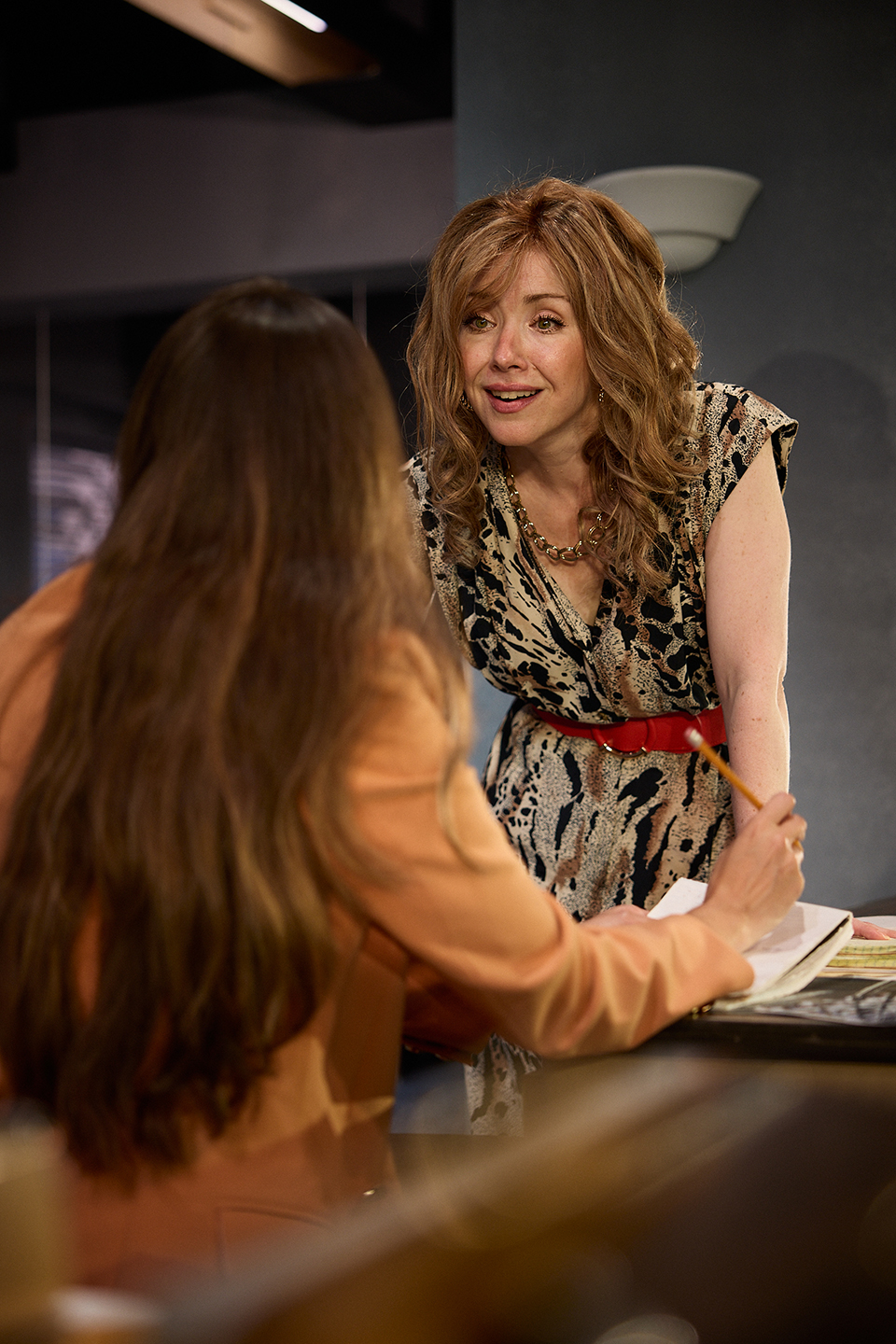
Caitlin Clouthier as Edna Buchanan talks to Kristal Millie Valdes as Anna in the Miami Herald newsroom in the Miami New Drama world premiere of “Dangerous Days.” (Photo courtesy of FURIOSA Productions)
Clouthier, who describes herself as “a closet introvert,” hadn’t heard of Buchanan before she auditioned – nor did she know the name and story of Arthur McDuffie. In that, she wasn’t alone: Made up of people who were very young or not yet born in 1979-80, most of the locally based cast didn’t know about McDuffie’s case either.
To take on the role of Buchanan, the actor read the reporter’s 1987 memoir “The Corpse Had a Familiar Face.” Though she has never been a journalist nor covered thousands of murders as Buchanan did on the crime beat, Clouthier says the book provided a window into the Pulitzer winner’s thought process.
“I resonated with her drive and her joyful disregard for what other people thought she ought to be doing,” says Clouthier, who will conceal her long, curly red hair beneath a blonde wig to play Buchanan.
“Generally, I’m a character actress who doesn’t play a lot of real people. This is a woman who is very well-known and still alive…Any woman who has ever had a dream can relate. She lives her dream loudly and a bit recklessly for her emotional well-being.”
Clouthier and Roderick Randle, who portrays McDuffie, are the only two actors who play a single role in “Dangerous Days.” Jovon Jacobs, Caleb Scott, Krystal Millie Valdes, Rene Granado and Trovillion play multiple roles, allowing for a more sweeping telling of the story. Except for Scott’s role as Marshall Frank, the detective who was captain of Dade County’s homicide division, the names of characters have been changed, though most are modeled on people who lived the story.
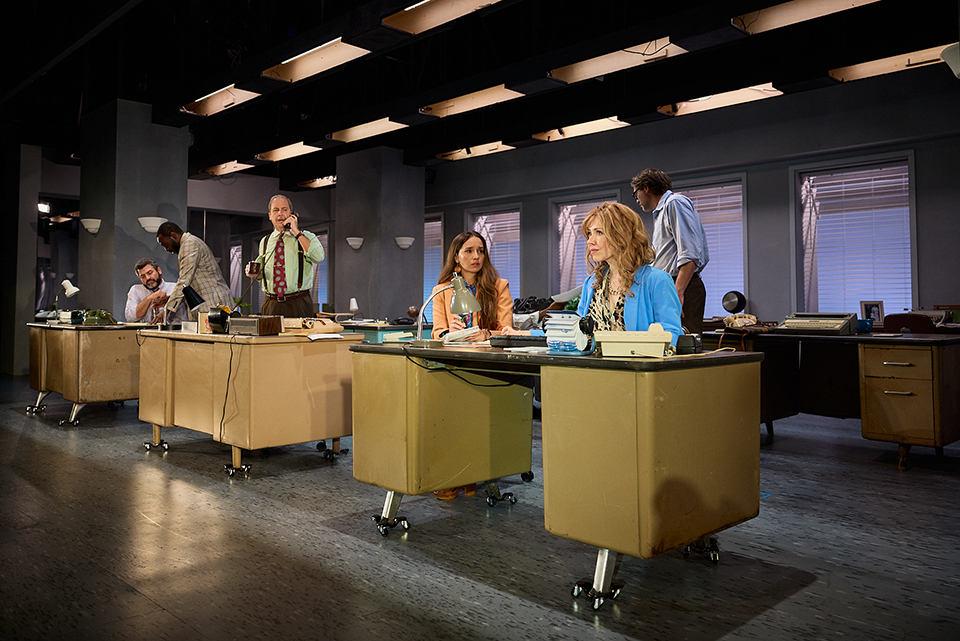
Caitlin Clouthier as crime reporter Edna Buchanan (right) contemplates her next move in the Miami New Drama world premiere of “Dangerous Days.” (Photo courtesy of FURIOSA Productions)
Randle, praised by director Wineman as bringing “so much warmth to the character of Arthur – you fall in love with him the first time you see him,” didn’t know of McDuffie, Buchanan or the riots when he was cast but has found multiple points of connection in the role.
“We’re giving him the voice he never had, telling the story from his perspective. It’s cathartic to have the victim express his feelings,” Randle says. “It’s important to keep the awareness of this happening. To feel and see it happen in a different way. It’s heartbreaking . . . The more we go through the text and the show, I realize he’s not too far off from who I am, in the way he loved his family, in the music he listened to.”
Jacobs, who appeared with Randle in Miami New Drama’s 2018 production of “One Night in Miami,” plays Bobby, an officer inspired by a cop who was a high school classmate and longtime friend of McDuffie. It is Jacobs who makes the audience “see” and feel the fires burning through Black neighborhoods during the riots. And he’s also a conduit for McDuffie to have his say.
“I absolutely think Bobby is summoning Arthur’s spirit; that’s exactly the angle we’ve taken with this piece,” says Jacobs. “Whenever he shows up, it’s because Bobby is thinking about something in reference to him, whether he’s questioning something about the case or doubting decisions he made. Arthur pretty much acts as his inner voice, which gets spoken through Bobby, his very close friend.”
Krystal Millie Valdes, who was just highlighted in American Theatre Magazine as one of six Miami theater workers to watch, plays the mysterious Anna and other roles in “Dangerous Days.” No spoilers, but we can say that the younger Anna is an aspiring journalist who attaches herself to Buchanan in the newsroom and on assignment.
“I play music for kids at the Institute of Contemporary Art in Miami, and I have to pass by the place where this happened. Every time I go, I cry,” says Valdes, who was born in Miami, grew up in a Cuban American family and made a decision to remain in her hometown to build her career.
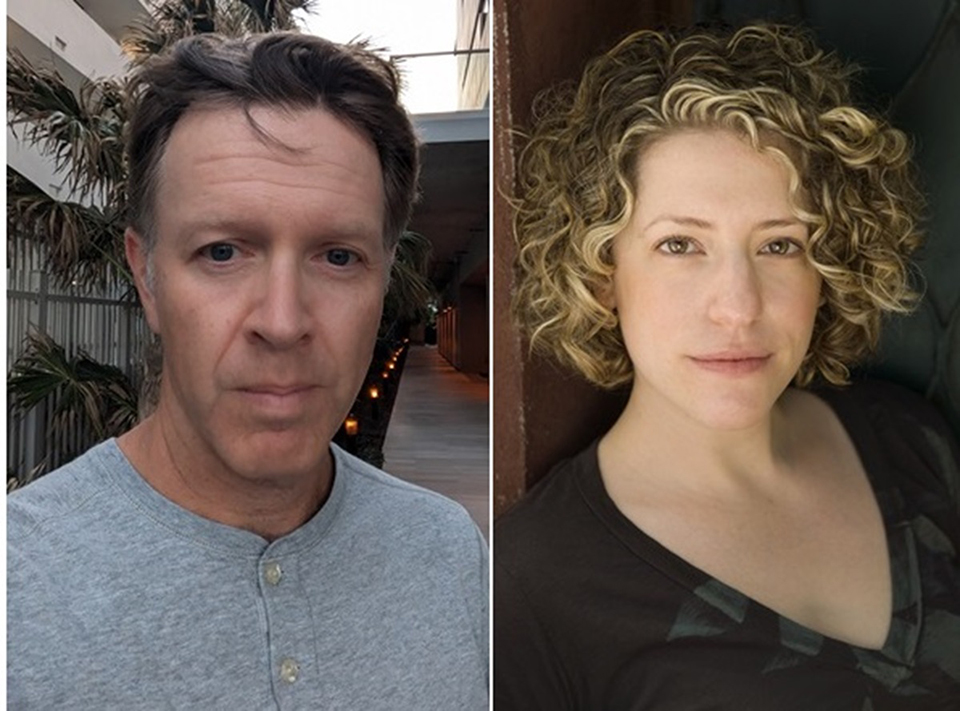
Nicholas Griffin, left, wrote the book “The Year of Dangerous Days” and has written the world premiere play “Dangerous Days” for Miami New Drama. At right, New York-based director-choreographer Jen Wineman, directs. (Photos courtesy of Tomas Griffin and Erik Pearson)
She praises Griffin’s willingness to rewrite and revise, and the window he provides into other characters: “Before, the script was full of monologues. Now, the characters work through trauma with people they otherwise wouldn’t have access to.”
Born in Spain, Rene Granado also grew up in a Cuban American family in Miami. In “Dangerous Days,” he plays a racist cop called Vivec, one of the officers who beat McDuffie; the operator of the tow yard where McDuffie’s motorcycle – mangled by the police to try to make their claim of an accident credible – was taken, and others.
“This play is about giving a version of Arthur McDuffie a voice,” says Granado. “This is still happening today in Miami and throughout the United States, even though a lot has changed. This did happen. Life moves forward, and we tend to forget….You have to stay vigilant and hold people accountable.”
Trovillion notes that Wineman is giving the play “a ‘Front Page’ type of energy – fast and furious” (he references a play and several movies that are among the all-time great examples of comedies about newspapers) and that the humor in it is necessary “in a story as dark as this.”
Scott, a playwright as well as an actor, emphasizes that “Dangerous Days” is more than a “retelling of horrors of the moment.” Secrets revealed, the psychological toll on Buchanan, McDuffie’s friend trying to find his way back to humanity – many threads converge in the play.
“There’s a lot of today in this moment. A lot of wounds that haven’t healed. And a lot of truths that persist,” says Scott.
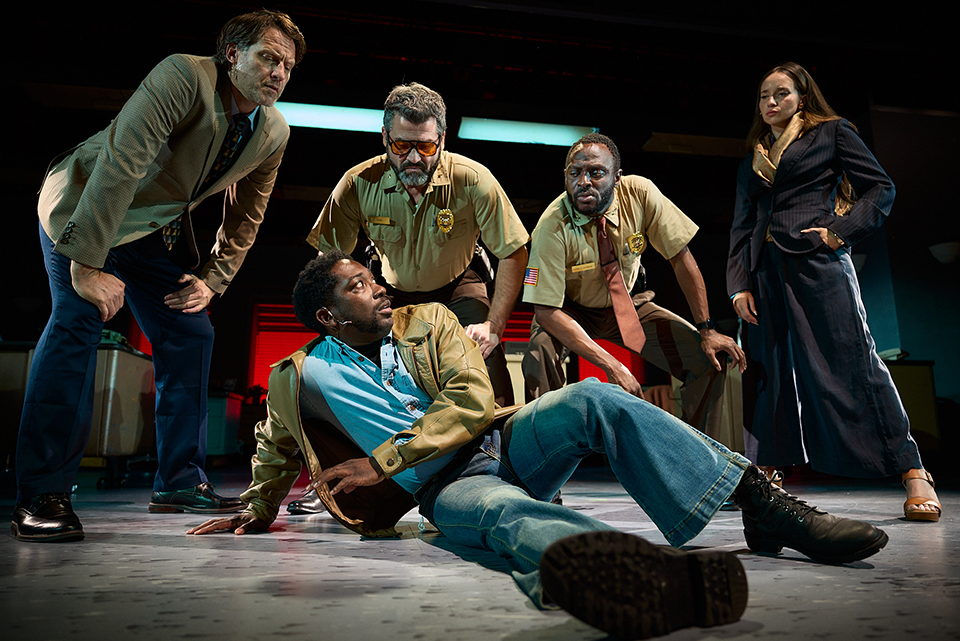
From left, Caleb Scott, Rene Granado, Jovon Jacobs and Krystal Millie Valdes surround Roderick Randle as Arthur McDuffie in the world premiere of “Dangerous Days.” (Photo courtesy of FURIOSA Productions)
Hausmann notes that, among its many themes, “Dangerous Days” is about the power of local journalism and calls journalists “the last line of defense of our civilization.”
As writers in a vastly altered 21st-century media landscape fight to keep readers informed, Hausmann believes it’s also critical to remind Miamians of their history.
He adds: “People don’t remember Elián, and that was 24 years ago. They don’t remember Arthur McDuffie, and that was 44 years ago. They don’t remember that the Colony Theatre was segregated until 1964. A lot of Miami history is hidden. It feels like it’s our responsibility to change that.”
A final note about Arthur McDuffie and memory.
A historical marker stands at 3800 N. Miami Ave., near the spot where McDuffie was savagely beaten on Dec.17, 1979.
With two of his adult children present, the marker was unveiled on Feb. 24, 2024.
WHAT: World premiere of “Dangerous Days” by Nicholas Griffin
WHERE: Miami New Drama production at the Colony Theatre, 1040 Lincoln Road, Miami Beach
WHEN: Previews 8 p.m. Thursday, April 4, and Friday, April 5; opens at 8 p.m. Saturday, April 6, with limited tickets remaining; regular performances 8 p.m. Thursday-Saturday, 3 p.m. Sunday, through April 28
COST: $46.50, $66.50, $69.50, $76.50, $83.50 ($101.50, $141.50, $181.50 for some opening night tickets)
INFORMATION: 305-674-1040 or miaminewdrama.org
Published with permission of ArtburstMiami.com, a nonprofit source of dance, visual arts, music and performing arts news.

